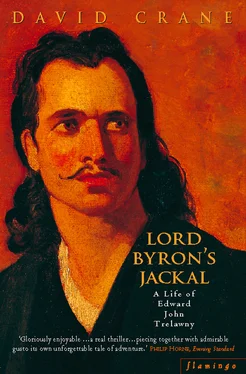On board was the greatest of all Philhellenes, Lord Byron, and at his side a figure who embodies more vividly than anyone else the impact for good and ill that Byron had on the generation of Romantics who went to fight for Greek independence. With the exception of Byron he is probably the only English volunteer of whom anyone has heard, and yet for all that he said and wrote of himself in a lifetime of ruthless self-promotion there is scarcely a fact from his birth onwards that biography has not had to prise free of the lies with which he covered his tracks. He called himself one thing when the parish register gives another, claimed the friendship of Keats when he never met him; railed at his poverty with a private income, and boasted of an exotic past as a pirate when he was no more than a failed midshipman with the diluted romance of his family name, a squalid divorce and a musket ball in a knee to show for his first thirty years.
‘But tell me, who is this odd fish?’ Keats’s friend Joseph Severn demanded when he first met him in 1822 and it is a question biographers have been trying to answer ever since. 6 To modern scholarship he is one of the great obstacles to historical truth, a compulsive braggart and liar. To the late Victorians he was the last apostolic link with its Romantic past, the intimate of Byron and Shelley through whom the ‘mighty dead’ spoke to a smaller and meaner age. 7 To his contemporaries though – more vivid, more imaginatively ‘true’ than either the Grand Old Man of Millais’ portrait or the fraud of modern research – he was the man Severn himself dubbed ‘Lord Byron’s Jackal’; 8 the man known to his friends with an impartiality which perhaps suggests why his name is not among the Philhellene dead, as ‘Greek’ or ‘Turk’ Trelawny.
My birth was unpropitious. I came into the world, branded and denounced as a vagrant; for I was a younger son of a family, so proud of their antiquity, that even gout and mortgaged estates were traced, many generations back, on the genealogical tree, as ancient heirlooms of aristocratic origin, and therefore reverenced. In such a house a younger son was like the cub of a felon wolf in good King Edgar’s days, when a price was set upon his head.
Trelawny’s Adventures of a Younger Son 1
ONE OF the most depressing assumptions of modern biography is the belief that the truth of men’s or women’s lives always lies in the trivia of their existence. There is often a devotion to the minutiae of a subject’s life that no biographer would dream of expending on his own, a kind of displaced egotism which produces the biographical equivalent of ‘Parnassian’ poetry or possession football, an intricate and over burdened account which bears as much relation to the proper business of biography as chronicle does to history.
The most part of most lives is no more interesting than that of a cat and as both subject and practitioner of biography no one better illustrates this fact than Edward John Trelawny. At some stage in an obscure and embittered youth he seems to have taken stock of his early years, found them wanting in every detail and invented for himself a wilder and more glamorous history of rebellion and adventure which he then successfully maintained in conversation and print for another sixty years.
Of all the silences open to a human being on the subject of himself, Trelawny’s is that of a man who knows how little of interest there is to say, and there is an important lesson to be learned from his deception. There are certainly writers like Shelley or Dickens whose creative life is intimately connected with the rhythms and textures of everyday existence, but the ‘Trelawny’ who still matters, the ‘Trelawny’ Byron and Shelley could both call friend, is the ‘Trelawny’ of myth and not dull reality, the romantic hero who sprang frilly formed from out of his own fantasies and not the failed midshipman modern scholarship has put in its place.
Edward John Trelawny was born on 13 November 1792, that rich and varied year in the history of English Romanticism, the year which saw the birth not just of two of its greatest leaders in Shelley and John Keble but of its hidden and unsuspected nemesis in the infant shape of the future ‘Princess of the Parallelograms’ and wife to Lord Byron, Anne Isabella Milbanke. Through both his parents Trelawny was descended from some of the most colourful figures in English and West Country history, and at the end of the eighteenth century the senior branches of his mother’s and father’s families were still wealthy and important landowners in their native Cornwall. In later years Trelawny usually claimed to have been born in Cornwall himself, but whatever he inherited in terms of character from West Country forebears who fought at Agincourt and against the Armada, the less romantic setting for his own birth was almost certainly his grandfather’s house in Soho Square from where, on 29 November, he was baptized John in the parish church of St Mary Le Bone.
The little we know of his early life comes from a work of fiction that the forty-year old Trelawny foisted on a credulous world as ‘autobiography’ under the title of Adventures of a Younger Son . There is no more than a tiny fraction of it that careful examination has left intact as reliable history, but if among all the fantasies with which he embroidered his life there is one subject on which he can be trusted it is that of his parents, as unlovely a couple from all existing evidence as even their son portrayed. His father was a Charles Trelawny, a younger son himself and an impoverished lieutenant-colonel in the Coldstream Guards; his mother was Mary Hawkins, a sister of Sir Christopher Hawkins Bt., of Trewithen, ‘a dark masculine woman of three and twenty’ with nothing to recommend her but an inheritance. 2 They met at a ball. He was the handsomest man in the room, she apparently the richest catch. In the eyes of the impoverished twenty-nine-year-old officer, wrote their son with that dry economy which characterizes his best prose, ‘Rich and beautiful soon became synonymous’.
He received marked encouragement from the heiress. He saw those he had envied, envying him. Gold was his God, for he had daily experienced those mortifications to which the want of it subjected him; he determined to offer up his heart to the temple of Fortune alone, and waited but an opportunity of displaying his apostacy to love. The struggle with his better feelings was of short duration. He called his conduct prudence and filial obedience – and those are virtues – thus concealing its naked atrocity by a seemly covering.… But why dwell on an occurrence so common in the world, the casting away of virtue and beauty for riches, though the devil gives them? He married; found the lady’s fortune a great deal less, and the lady a great deal worse than he had anticipated: went to town irritated and disappointed, with the consciousness of having merited his fate; sunk part of his fortune in idle parade to satisfy his wife; and his affairs being embarrassed by the lady’s extravagance, he was, at length, compelled to sell out of the army, and retire to economise in the country. 3
In the history and literature of a century famous for its battles of the generations, it is doubtful whether even Shelley or Samuel Butler pursued their fathers’ memory with the same dogged and public hatred that Trelawny showed for his. There is a notorious tale he tells in Adventures of what he calls his first childhood ‘duel’, 4 a mythic battle to the death with his father’s pet raven which in its capacity for violence and surrogate vengeance is the archetype of all the real and imagined struggles of his life ahead, of those fights with maddened stallions or the savage encounters with figures in authority who seemed to his adult mind the reincarnations of early tyranny.
Читать дальше












